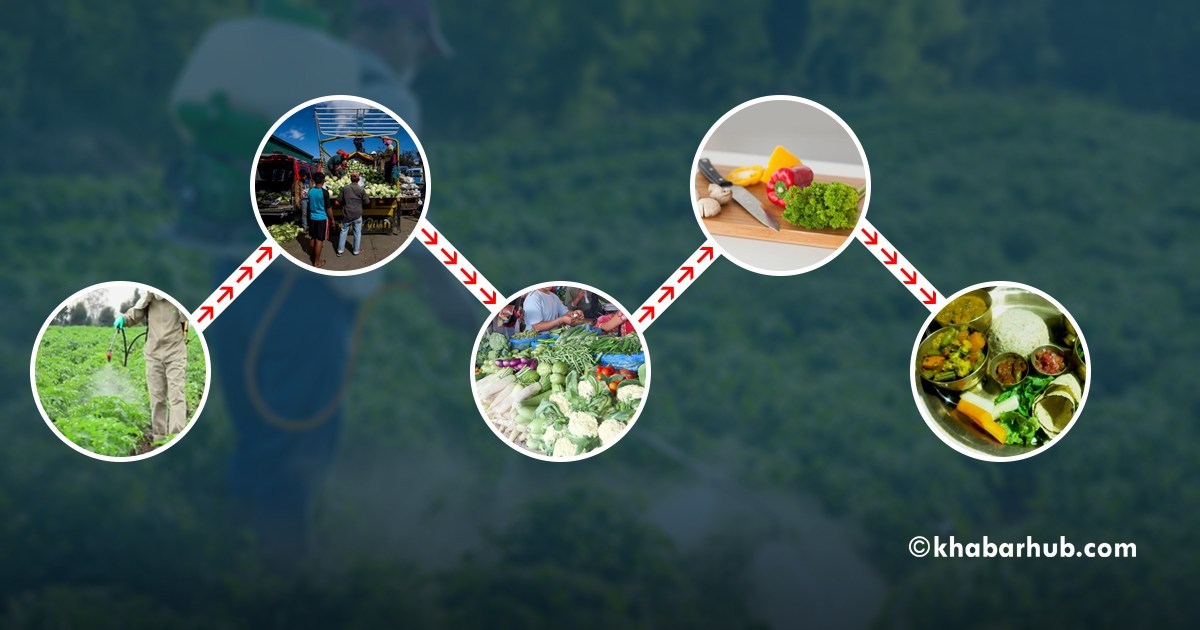0%

KATHMANDU: Even as Supreme Court of Nepal has passed the order to conduct the test of the presence of chemicals in fruits and vegetables imported from India, it will take a week or more if the order is implemented in right earnestness. Dr. Niranjan Parajuli, president of Nepal Chemical Society, says that presence of chemicals in imported fruits and chemicals such as organophosphates and carbamate cannot be ruled out as vegetables are being grown for sale in off-season time and producers use a lot of artificial fertilizers and pesticides to grow them.
Bishwa Babu Pudasaini, Vice-President of Nepal Chemical Society explains scientifically, ”There are basically two types of chemicals found as leftover on fruits and vegetables. Pesticides sprinkled on vegetables and fruits while they are on trees have no effect when these fruits and vegetables are kept in stock for a minimum period of a week. However, if farmers due to lack of knowledge and training sprinkle more chemicals than what is required, then in such a condition it is hard to wash off the elements chemicals within a week and it will stick around for a longer period of time.”
Public Health Service Act, 2075 BS among other things speak about the standard of the items which are directly consumed by general people. The production, storage, and sale of such consumer items must meet the fixed standard of public health. But the government failed to erect a sufficient number of test labs and diagnostic centers to check vast tonnage of fruits and vegetables on border points and prevent them from rotting in the containers and trucks. Compulsory testing of the level of pesticides in imported fruits and vegetables demand vast preparation to build up the testing labs and trained manpower to go for speedy clearance in order to avoid a situation of ‘supply crisis’ and a condition of ‘short supply’.
Tons of vegetables and fruits which have involved traders from both the sides India and Nepal will suffer a huge loss resulting in a direct nosedive in business prospect between the two countries if the government does not work out all the compulsory tests to check chemicals in food items imported from the southern neighbor.
Atul Upadhyay, nutrition expert, does not give much importance to business and trade angle in the entire episode that is currently raking up the country. He says even with limited logistics and wherewithal the government must go for mandatory chemical test on India-Nepal border no matter Nepal faces the short supply of food items and traders suffer a loss. He continues further, my team and others had conducted the test applying the ‘kit method’ for detecting chemicals in fruits and vegetables in Kalimati just in front of the minister. “It is unfortunate that the government is still struggling to develop the system of testing chemicals in food items and hence the present hue and cry on the entire issue,” he said adding that if the government shows the political will, it can go for other easy-to-adopt methods till extensive level of chemical testing incurring billions of rupees is put in place. The government’s dilly-dallying on this matter will take a huge toll on public health spurring the malfunctioning of lung, kidney, uterus and various other human internal organs, cautions the nutrition expert.
Ways to reduce or eliminate the presence of chemicals in vegetables and fruits
There are some commonly practiced methods to reduce the chemical contents from fruits and vegetables. Atul Upadhyay proposes the following techniques for every home to follow: Keep the fruits and vegetables for at least one hour in water before you eat or cook. However, a high dose of chemicals will not wash away so easily except reducing its level to some extent.